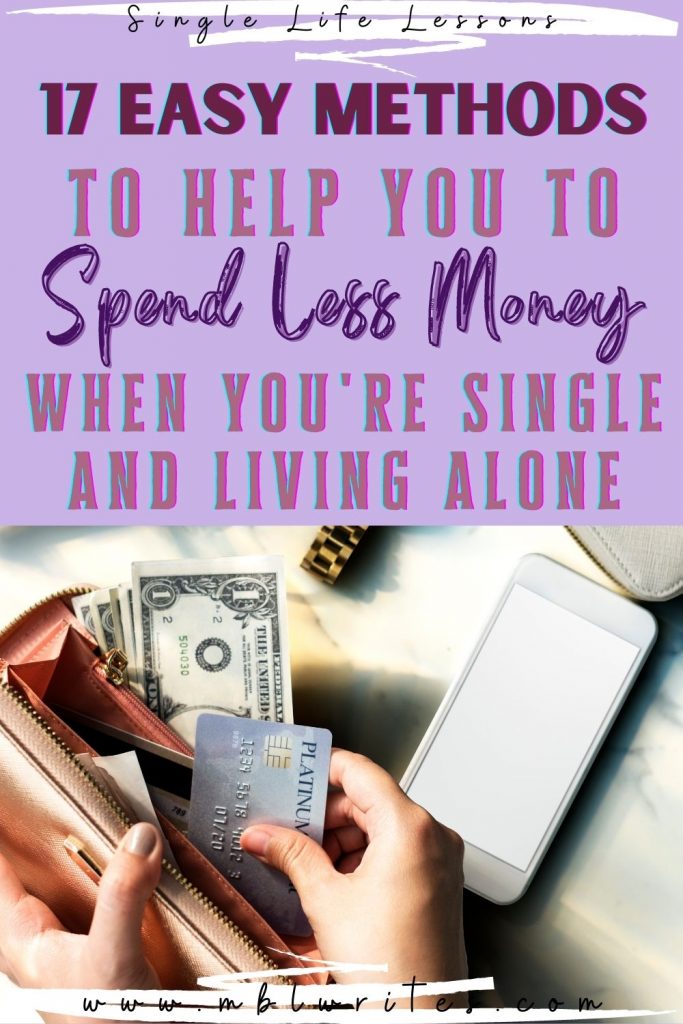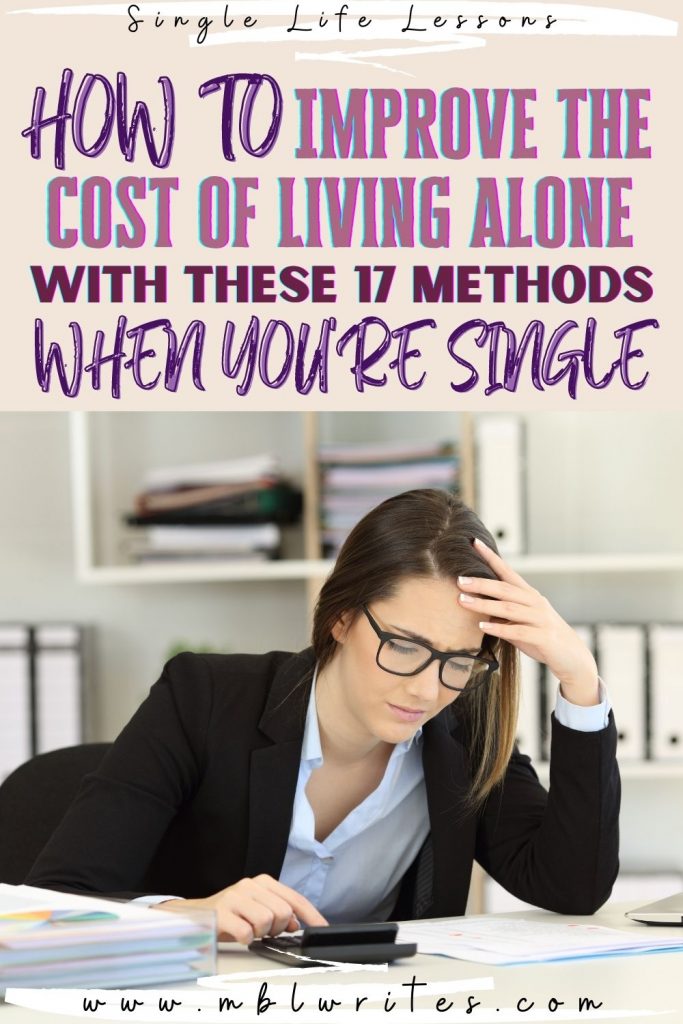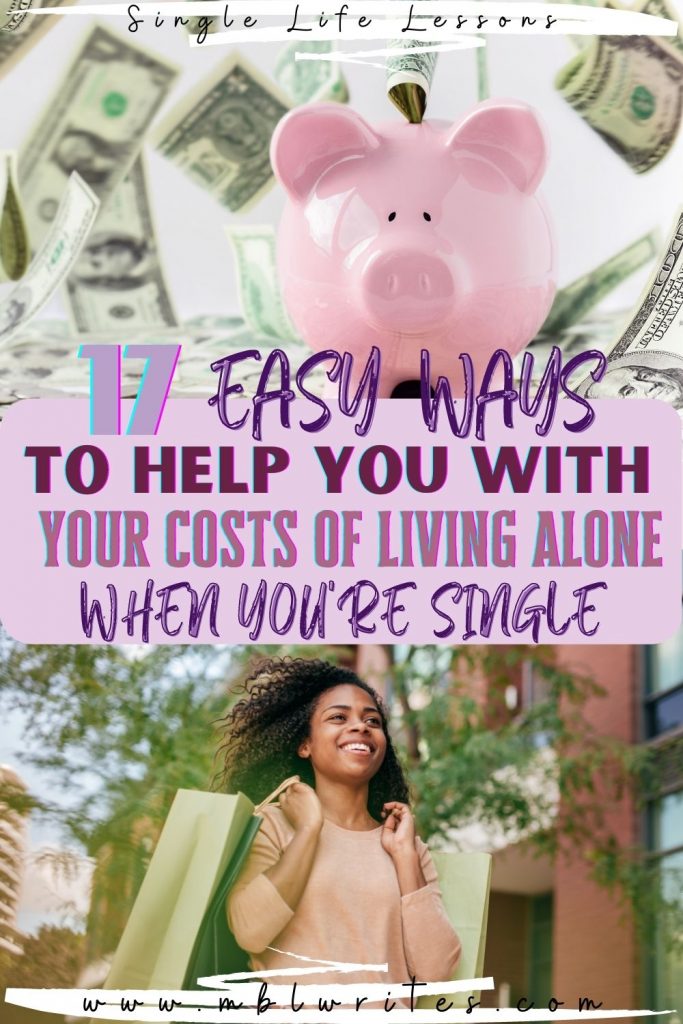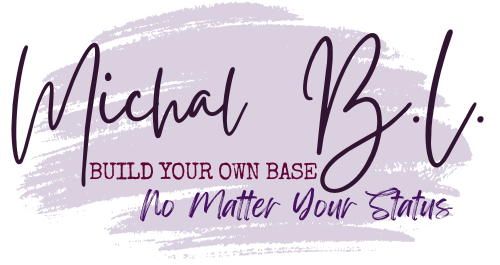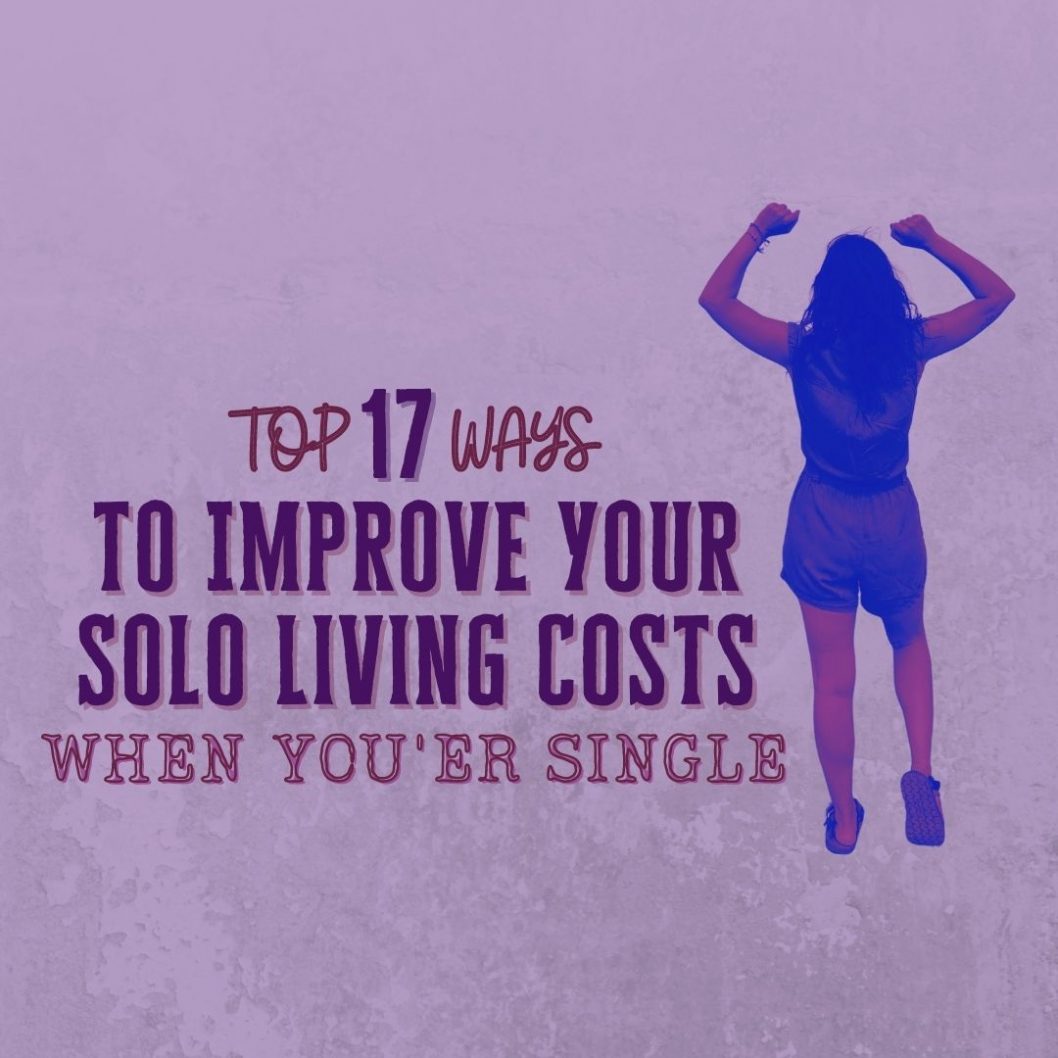
How to Improve Your Solo Living Costs
These are the top 17 ways & methods to help you improve your solo living costs and save money, when you’re single.
Being single, financing yourself can be both a hardship and a convenience. While you only need to finance yourself, you also have no one else to help you or fall back on. There’s no one else depending on you, but you also have no one else to depend on. An apartment for one also won’t necessarily cost less than an apartment for two, or at least not by much. Yeah, you are the sole person to provide for, and it’s easier to provide for one. But you’re also the sole provider, which can be straining at times. Especially with the cost of living sky-rocketing all over the world, and our income remaining the same.
None of the following methods are big life changes, they won’t require huge sacrifices or too many difficult decisions. Which makes them fairly simple and easy to implement in your life, and get used to these changes you make. While they won’t save you thousands of whatever currency you use, they will save you at least a few hundreds, which definitely mounts up in the long run. It’s crucial to note that I’m not a financial consultant or expert. Nor am I giving you financial advice. These are just methods that I use in my daily life to reduce the costs of living alone.
1. Home cooking and meal preparations
You don’t have to be a chef to cook for yourself, nor do you have to make anything too intricate. You can pick and choose simple and easy recipes to follow, and every week make one or two pots (or containers). This can also be fun and help you discover new things you like. It challenges you and helps you develop some useful skills. And yeah, it will save you money from always ordering in or eating out. As well as taking food to work, instead of buying it every time. Not to mention, you’ll also likely eat better, healthier meals. Either way, it’s a great way to invest in and take care of yourself.
2. Water down products
This might sound silly, even a bit extreme and stingy, but it definitely can save you a whole load of money. Most products are also made so concentrated, that you don’t really need to use it as is. You can water it down a bit and it will still do the job, and last for double the time. Things like laundry detergent, dish soap, shampoo & conditioner, etc. These are also products that aren’t cheap. So slowing down the frequency in which you restock them, can certainly make a difference.
3. Moderate product usage
If you still rather not water down your products, you can at least moderate the usage of them. Again, most of them come so concentrated that you don’t even need to use much of it, for it to do its job. Laundry detergent is the classic example… We use a whole lid-full, when really all we need is a third of that amount. Same goes for shampoo, you don’t need a whole palm-full. Even with your toilet paper, try to use less at a time, and it will make a difference. This will also help you finish your products slower.
4. Budget & monitor your expenses
Again, I’m not a financial consultant, but monitoring and keeping track of my own spending has definitely helped me spend less. You don’t need to write every single thing down, just try to go over your credit card statements and make sure you recognise all of the charges. This will also help you see what you’re spending most of your money on, and see where you can make some cuts. If you see that you go overboard, make a table for yourself with how much you can and want to spend on each category.
5. Limit your outings
You don’t have to go out every single evening, nor do you have to go out more than once or twice a week. I know that can suck, but when you want to save money, or if you don’t have enough coming in at the moment… This is the best, easiest way to spend less. You’ll probably even enjoy your outings more if they are rarer. Especially since you’ll only choose the best ones to keep. When you do go out, though, try to not splurge too much and keep it within your means.
6. Be aware of electricity use
This may come down to pocket change, but every bit counts, and in the end, it also all adds up. So make sure to turn off lights, and any other electronics you may have put on throughout your day. If you don’t need the AC, heater or fan anymore, turn it off. Make a habit of checking the lights and anything else before you leave the house, and turning them all off.
7. Don’t buy if it’s not finished yet
I like to buy only once I’ve finished what I currently have in the fridge, or when I’m close to finishing it. Otherwise, it will probably go bad in the fridge and it’s not only money wasted, but food as well.
8. Only buy for the week
Furthermore, try to just buy week to week, and no further. Bulk buying may be cheaper as you pay less per unit, but more gets wasted as it may sit in your pantry for a very long time. Which means, you either forget it’s even there, and keep buying more of that product. Or it goes bad and you have to throw it away. I found that buying only what I need for that week forces me to buy less, as well as spend less in the long run. There’s absolutely no reason to stock up on anything.
9. Buy cheaper brands and products
In addition, I also try to buy the cheapest brand or product I can in every category. You don’t need the fanciest shampoo or detergent, nor do you need the most expensive rice. The supermarket brand rice (and every other product) is just as good, and usually also a fraction of the price. This is true for most types of foods, soaps, toiletries and more.
10. Hand-me-downs
As fun and exciting as it is to buy things brand-new, especially for yourself, it can also eat up a good chunk of your money. A great way to save at least some of your shopping, is to go shopping in your friends and family’s wardrobes. Personally, I’ve always loved getting my hands on my sister’s clothes. She has great fashion sense and taste, and takes very good care of her clothes. So if you also have someone like this in your life, it’s a great option for you to save some money.
11. Charity, thrift & second hand stores
If you don’t have anyone you can get hand-me-downs from, you can also check out some charity, thrift or second-hand stores. You may need to pay and can’t get things for free, but the prices are very reasonable and you can even find some great treasures in these stores. There are also some high-end brands for very cheap, which is something you can’t find in the actual brand stores. Not to mention, that this is much better for the environment. Some stores will even give you credit if you bring your own donations.
12. Buy reusable products (instead of throwaways)
I understand that washing up can be a nuisance, but it’s well worth it if it helps you save some money. Not only are throwaways really bad for the environment, they’re also one of the biggest money wasters. Most of them get thrown away after only one use, and we even tend to use them freely with no moderation. Which is a problem we don’t have with reusable products.
13. Cut back on luxuries
You don’t need to have a glass of wine every single day, nor do you need to buy yourself the latest and greatest products and clothes. You also don’t need to change your phone and computer every year or two. Perhaps as a nice incentive and prize every so often… But buying these things on a regular basis is just a huge waste of money.
14. Cancel subscriptions
One of the things that was hardest for me, was cancelling my subscription boxes, as they were making me so happy. But it also cost me a lot of money, and I didn’t find it to be worth it on a regular basis. This is also true for newspaper / magazine subscriptions, streaming services, or any others you may have. Most of them you don’t even have to cancel forever, perhaps purchase them just every so often.
15. Pay yearly, not monthly
If you do have some subscriptions that you don’t want, or even can’t cancel, try to twitch it to a yearly plan instead of a monthly one. Most yearly plans on most platforms and sites, will work out to be cheaper per month. It may not be by much, but again, every cent and penny counts. I also like to have less transactions on my card, and it’s also less to keep track of. Just pay it all in one go, the money is coming out of my account either way.
16. Make coffee / tea at home
I’m a huge coffee drinker, and I used to love going out to get one for myself. And while they’re not the most expensive ‘addiction’ I could’ve had, it all adds up in the end. This doesn’t mean you can’t get a coffee every so often. Just try to cut down and make them more at home, as they come out cheaper. If you need to leave the house, instead of getting one on the way, just make it at home and take one with you in a to-go-cup.
17. Delete apps from your phone
If you find yourself instinctively clicking on shopping apps, then getting too tempted by irresistible products to stop yourself from buying them… A great way to prevent over-spending, or impulsive purchases is to just delete the app off your phone. Shopping apps are not something that you actively need on your phones, certainly not at all times. And especially if you don’t have the money for it. This is true for clothes, jewellery, beauty products, food apps, or anything else that is a luxury and not a necessity. If you get emails from these stores, it’s also a great idea to unsubscribe from them.
In conclusion – find your balance and moderate
As I told my mother today, after she said that today was an expensive day – just make tomorrow (and probably the next day as well) a cheaper day. It’s all a matter of finding your balance and knowing when and how much to spend, depending on how much you have. You don’t have to cut yourself off completely, you just have to be responsible and reasonable. Don’t spend what you don’t have and don’t buy what you don’t really need. It’s not a matter of making big, dramatic changes in your expenses… It’s a matter of shaving corners, making small, simple and easy steps to help you improve your solo living costs and save money, when you’re single. Which is made easier when you don’t have anyone else depending on you, but you also don’t have anyone else to fall back on. So it’s important to learn how to fend for yourself.
Stay safe, stay healthy and stay strong!
Michal B.L.

please share, pin and spread the love 🙂
